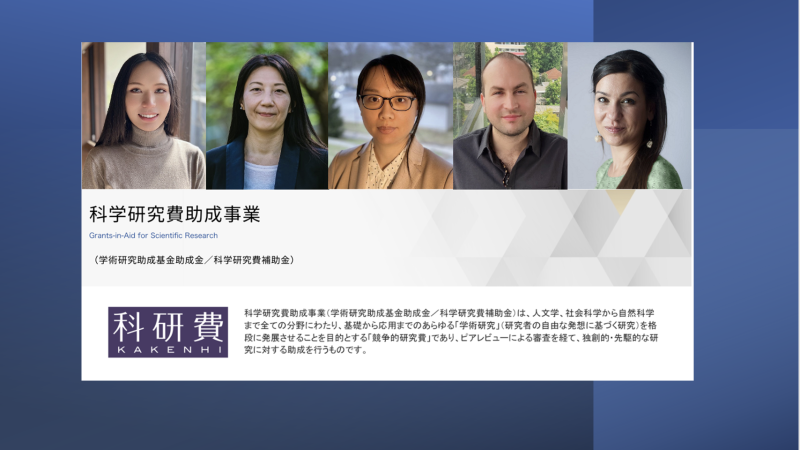Tokyo College Researchers Awarded JSPS Grants-in-Aid for Early-Career Scientists and JSPS Fellows

We are pleased to announce that Project Assistant Professor Xinyu Promio WANG, Postdoctoral Fellows HOSOKAWA Naoko, TSAI Hung Yin, and Laur KIIK have each been awarded a Japan Society for the Promotion of Science (JSPS) Grant-in-Aid for Early-Career Scientists. Visiting Scholar Lidiya SHAMOVA has been awarded a Japan Society for the Promotion of Science (JSPS) Grant-in-Aid for JSPS Research Fellows.
Project Assistant Professor Xinyu Promio WANG was awarded the grant for a project titled “Mechanisms of Self-Justified Discrimination: The Case of Trans Chinese in Japan.”
Project summary:
This project seeks to explore how trans Chinese diaspora conceptualises sense of placeness and placelessness in relation to their everyday lived experiences in Japan. While existing empirical evidence indicates that trans Chinese are socially marginalised in both Japan and China, a crucial question arises from here is therefore, where is their “place”, and how do they relate to such “place” in relation to their perceived marginality and discrimination? By focusing on the intersectionality between human mobility, digital connectivity, as well as gender and sexuality, this project aims to shed light on this research question and consequently serves as a channel for voicing out trans migrants’ often unheard, and indeed, neglected voices.
Postdoctoral Fellow HOSOKAWA Naoko was awarded the grant for a project titled “Analysis of the EU Clear Language Initiative and Its Possible Application to Japanese Language Policy.”
Project summary:
This study investigates the implementation and outcomes of language policies in Europe and examines their applicability in Japanese society. In recent years, Japan has been promoting the use of 'easy/kind Japanese' (yasashii nihongo) in order to provide easy-to-understand information to non-native speakers of Japanese. In order to further develop these efforts, this study focuses on the 'Clear Language' guidelines introduced by European institutions. These guidelines aim to facilitate intercultural communication in English and other common languages. Analysing the achievements and challenges of European institutions, which have been committed to multilingualism since their establishment, is considered important for understanding the role of language policy in Japan, where society is becoming increasingly internationalised and diversified.
Postdoctoral Fellow TSAI Hung Yin was awarded the grant for a project titled “The Construction of Medicine v.s. Non-medicine: a Historical and Social Study of Herbs' Materiality and Knowledge Productions in the Local and Global Context.”
Project summary:
"What is medicine?" More specifically, how does the dichotomy between medicine and non-medicine come to be? To answer these questions, this project focuses on herbs of Han medicine: some herbs are now categorized into supplements, while others are medications. Furthermore, these herbs are often considered more "natural" and "softer" than chemical-compound artifact pills yet still treat our diseases or enhance our body functions. These beliefs thus bring out two topics: the connection between herbs and nature, which we take for granted and are under-researched, and the relationship between herbs and human enhancement. We often link human enhancement with those fancy technologies, such as gene-editing, but overlook that we practice human enhancement by taking these "natural" medicines and supplements daily. This project surveys the narratives, knowledge productions, and supply chain of herbs to see what makes herbs into medicine or non-medicine and the conceptions of nature and human enhancement surrounding these herbs.
Postdoctoral Fellow Laur KIIK was awarded the grant for a project titled “Between Ecology, Nationalism, and China: An Ethnography of Interconnections in War-Torn Burma's Kachin Region.”
Project summary:
Global environmental crisis, surging nationalism, and China’s rise are each changing our world. But how do they connect? This research will show these interactions in a large but understudied region where China and India meet the long wars of Burma (Myanmar). It will build on my ethnographic research since 2010 among Kachin people in these borderlands.
Visiting Scholar Lidiya SHAMOVA was awarded the grant for a project titled “The Music of the Words.”
Project summary:
The purpose of this interdisciplinary research between linguistics and music is to create an original linguistic model by means of representing the uni-, bi- and multidimensional lexical fields with musical signs. It will create a prototype of the linguistic model, based on three initial lexical fields, that will be mapped onto music signs and harmonies. A survey to test the model across languages and cultural backgrounds will be presented to subjects in different countries. This model will find application in modern linguodidactics, linguoculturology, in various fields of musicology, music therapy, and logopedics. It could offer new paths in several types of pedagogical practices, music production, and text writing, as well as in medical and psychological therapies, and of course, in everyday life. This research could improve international communication, as it is strongly related to the field of bilingualism and multiculturalism. My goal is to draw attention to this topic through interdisciplinary developments in the field of the music of words.
JSPS Grants-in-Aid for Scientific Research <Kakenhi> are awarded on a competitive basis and are intended to significantly develop all scientific research, from basic to applied research in all fields. The grants provide financial support for creative and pioneering research projects that will become the foundation of social development.





